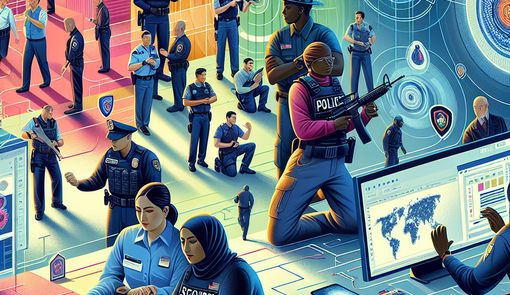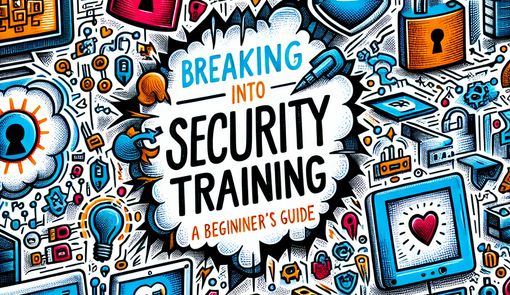Security Trainer
A Security Trainer educates and trains individuals and groups in various security practices, often related to physical security, surveillance, and emergency response.

Top Articles for Security Trainer
Sample Job Descriptions for Security Trainer
Below are the some sample job descriptions for the different experience levels, where you can find the summary of the role, required skills, qualifications, and responsibilities.
Junior (0-2 years of experience)
Summary of the Role
As a Junior Security Trainer, you will be responsible for delivering course content related to security protocols, operations, and measures to new hires and existing security staff within the organization. You will assist in developing and updating training materials, provide hands-on instructions, and evaluate trainee performance. You will work under the supervision of a senior trainer and contribute to creating a knowledgeable and prepared security team.
Required Skills
- Strong interpersonal and mentoring skills.
- Ability to adapt teaching methods to different learning styles.
- Proficiency in using training software and equipment.
- Good organizational and time management skills.
- Basic knowledge of laws and regulations relating to security and safety.
Qualifications
- Certificate or diploma in security training, law enforcement, or a related field.
- Prior experience in a security role is preferred but not required.
- Strong presentation and communication skills, with the ability to convey complex information clearly.
- Basic understanding of security systems, protocols, and procedures.
- Certification as a trainer from a recognized security training organization is a plus.
Responsibilities
- Deliver and facilitate security training sessions to new and existing employees.
- Assist with the development and revisions of training materials and curriculum to ensure up-to-date content.
- Conduct practical exercises and hands-on training to reinforce learning.
- Monitor and report on the progress of trainees, providing feedback and additional support as necessary.
- Maintain a positive and professional learning environment.
- Stay updated on the latest security trends, technologies, and best practices.
- Assist in administrative tasks related to training, such as scheduling classes and managing attendance records.
- Collaborate with other trainers and security personnel to create a cohesive and well-rounded training program.
Intermediate (2-5 years of experience)
Summary of the Role
The Security Trainer is responsible for developing and delivering security training programs to staff members. This role requires an individual with practical security experience, as well as excellent communication and teaching skills. The candidate will develop training materials, conduct training sessions, and continually update the curriculum to reflect the latest security threats and practices.
Required Skills
- Strong presentation and teaching abilities
- Familiarity with security equipment and technology
- Effective interpersonal skills to engage and motivate trainees
- Proficiency in creating and managing digital training material
- Critical thinking and problem-solving skills
- Adaptability to work with a diverse group of employees
Qualifications
- Minimum of 2 years of experience as a security professional or trainer
- Proven track record of developing and delivering security training programs
- Knowledge of the latest security protocols, technologies, and best practices
- Excellent verbal and written communication skills
- Ability to perform security risk assessments and security drills
- Experience in adult learning principles and different training methods
Responsibilities
- Develop and update security training curriculum to reflect current security threats and practices
- Deliver training to staff members including but not limited to security protocols, emergency procedures, and use of security equipment
- Conduct security assessments and drills to ensure staff understanding and preparedness
- Collaborate with security personnel to understand the specific training needs of the organization
- Monitor the latest trends in security and update training materials accordingly
- Assess training outcomes and adjust programs as needed to improve effectiveness
- Maintain records of training activities and employee progress
Senior (5+ years of experience)
Summary of the Role
A Security Trainer is responsible for developing and conducting training programs to enhance the knowledge and skills of security personnel. The role requires extensive experience in security protocols, instructional design, and training delivery to ensure that security teams are prepared to handle various security situations.
Required Skills
- Strong communication and presentation skills.
- In-depth knowledge of security protocols and emergency response procedures.
- Proficient in instructional design and educational technology.
- Ability to assess training needs and evaluate training program effectiveness.
- Excellent organizational and leadership skills.
Qualifications
- Bachelor's degree in Criminal Justice, Security Management, Education, or a related field.
- Minimum of 5 years of experience in a security role with a focus on training and development.
- Certifications such as Certified Protection Professional (CPP), Certified Security Trainer (CST), or similar are highly preferred.
- Proven experience designing and conducting security-related training sessions.
- Familiarity with various training platforms and methodologies, including online and in-person training practices.
Responsibilities
- Developing comprehensive security training programs in compliance with industry standards and company policies.
- Conducting regular training sessions for security staff, including both theoretical and practical exercises.
- Assessing the efficiency and effectiveness of training modules and making improvements as needed.
- Staying current with the latest security threats and training methodologies to provide up-to-date information to trainees.
- Evaluating the performance of security staff during and after training to identify areas needing further development.
- Creating training materials, manuals, and other educational resources.
- Collaborating with security management to understand training needs and objectives.
- Ensuring that all training programs adhere to legal and regulatory requirements.
See other roles in Education, Media, and Nonprofit and Education






